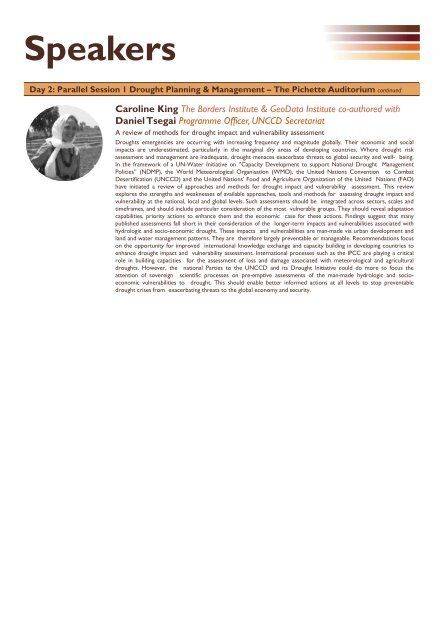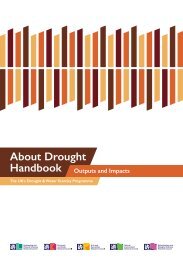DelegatePack_DroughtConference_20-21March2019
Create successful ePaper yourself
Turn your PDF publications into a flip-book with our unique Google optimized e-Paper software.
Speakers<br />
Day 2: Parallel Session 1 Drought Planning & Management – The Pichette Auditorium continued<br />
Caroline King The Borders Institute & GeoData Institute co-authored with<br />
Daniel Tsegai Programme Officer, UNCCD Secretariat<br />
A review of methods for drought impact and vulnerability assessment<br />
Droughts emergencies are occurring with increasing frequency and magnitude globally. Their economic and social<br />
impacts are underestimated, particularly in the marginal dry areas of developing countries. Where drought risk<br />
assessment and management are inadequate, drought menaces exacerbate threats to global security and well- being.<br />
In the framework of a UN-Water Initiative on ‘’Capacity Development to support National Drought Management<br />
Policies’’ (NDMP), the World Meteorological Organisation (WMO), the United Nations Convention to Combat<br />
Desertification (UNCCD) and the United Nations’ Food and Agriculture Organization of the United Nations (FAO)<br />
have initiated a review of approaches and methods for drought impact and vulnerability assessment. This review<br />
explores the strengths and weaknesses of available approaches, tools and methods for assessing drought impact and<br />
vulnerability at the national, local and global levels. Such assessments should be integrated across sectors, scales and<br />
timeframes, and should include particular consideration of the most vulnerable groups. They should reveal adaptation<br />
capabilities, priority actions to enhance them and the economic case for these actions. Findings suggest that many<br />
published assessments fall short in their consideration of the longer-term impacts and vulnerabilities associated with<br />
hydrologic and socio-economic drought. These impacts and vulnerabilities are man-made via urban development and<br />
land and water management patterns. They are therefore largely preventable or manageable. Recommendations focus<br />
on the opportunity for improved international knowledge exchange and capacity building in developing countries to<br />
enhance drought impact and vulnerability assessment. International processes such as the IPCC are playing a critical<br />
role in building capacities for the assessment of loss and damage associated with meteorological and agricultural<br />
droughts. However, the national Parties to the UNCCD and its Drought Initiative could do more to focus the<br />
attention of sovereign scientific processes on pre-emptive assessments of the man-made hydrologic and socioeconomic<br />
vulnerabilities to drought. This should enable better informed actions at all levels to stop preventable<br />
drought crises from exacerbating threats to the global economy and security.




